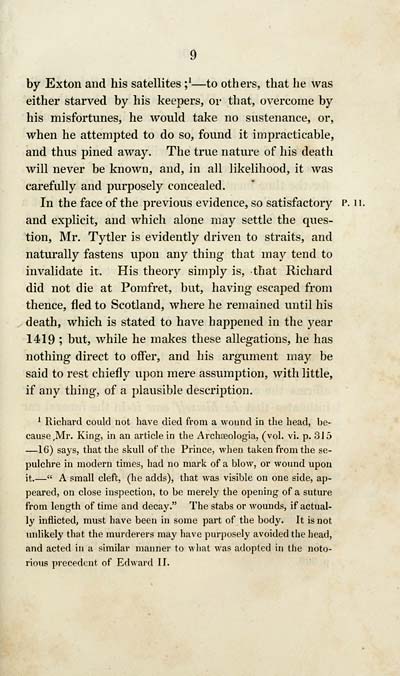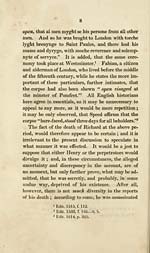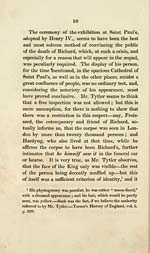Tracts, legal and historical
(25) Page 9
Download files
Complete book:
Individual page:
Thumbnail gallery: Grid view | List view

by Exton and his satellites ;' — to others, that he was
either starved by his keepers, or that, overcome by
his misfortunes, he would take no sustenance, or,
when he attempted to do so, found it impracticable,
and thus pined away. The true nature of his death
will never be known, and, in all likelihood, it was
carefully and purposely concealed.
In the face of the previous evidence, so satisfactory p. n.
and explicit, and which alone may settle the ques-
tion, Mr. Tytler is evidently driven to straits, and
naturally fastens upon any thing that may tend to
invalidate it. His theory simply is, that Richard
did not die at Pomfret, but, having escaped from
thence, fled to Scotland, where he remained until his
death, which is stated to have happened in the year
1419 ; but, while he makes these allegations, he has
nothing direct to offer, and his argument may be
said to rest chiefly upon mere assumption, with little,
if any thing, of a plausible description.
1 Richard could not have died from a wound in the head, be-
cause, Mr. King, in an article in the Archaeologia, (vol. vi. p. 315
— 16) says, that the skull of the Prince, when taken from the se-
pulchre in modern times, had no mark of a blow, or wound upon
it. — " A small cleft, (he adds), that was visible on one side, ap-
peared, on close inspection, to be merely the opening of a suture
from length of time and decay." The stabs or wounds, if actual-
ly inflicted, must have been in some part of the body. It is not
unlikely that the murderers may have purposely avoided the head,
and acted in a similar manner to what was adopted in the noto-
rious precedent of Edward II.
either starved by his keepers, or that, overcome by
his misfortunes, he would take no sustenance, or,
when he attempted to do so, found it impracticable,
and thus pined away. The true nature of his death
will never be known, and, in all likelihood, it was
carefully and purposely concealed.
In the face of the previous evidence, so satisfactory p. n.
and explicit, and which alone may settle the ques-
tion, Mr. Tytler is evidently driven to straits, and
naturally fastens upon any thing that may tend to
invalidate it. His theory simply is, that Richard
did not die at Pomfret, but, having escaped from
thence, fled to Scotland, where he remained until his
death, which is stated to have happened in the year
1419 ; but, while he makes these allegations, he has
nothing direct to offer, and his argument may be
said to rest chiefly upon mere assumption, with little,
if any thing, of a plausible description.
1 Richard could not have died from a wound in the head, be-
cause, Mr. King, in an article in the Archaeologia, (vol. vi. p. 315
— 16) says, that the skull of the Prince, when taken from the se-
pulchre in modern times, had no mark of a blow, or wound upon
it. — " A small cleft, (he adds), that was visible on one side, ap-
peared, on close inspection, to be merely the opening of a suture
from length of time and decay." The stabs or wounds, if actual-
ly inflicted, must have been in some part of the body. It is not
unlikely that the murderers may have purposely avoided the head,
and acted in a similar manner to what was adopted in the noto-
rious precedent of Edward II.
Set display mode to:
![]() Universal Viewer |
Universal Viewer | ![]() Mirador |
Large image | Transcription
Mirador |
Large image | Transcription
Images and transcriptions on this page, including medium image downloads, may be used under the Creative Commons Attribution 4.0 International Licence unless otherwise stated. ![]()
| Histories of Scottish families > Tracts, legal and historical > (25) Page 9 |
|---|
| Permanent URL | https://digital.nls.uk/95034306 |
|---|
| Description | A selection of almost 400 printed items relating to the history of Scottish families, mostly dating from the 19th and early 20th centuries. Includes memoirs, genealogies and clan histories, with a few produced by emigrant families. The earliest family history goes back to AD 916. |
|---|

